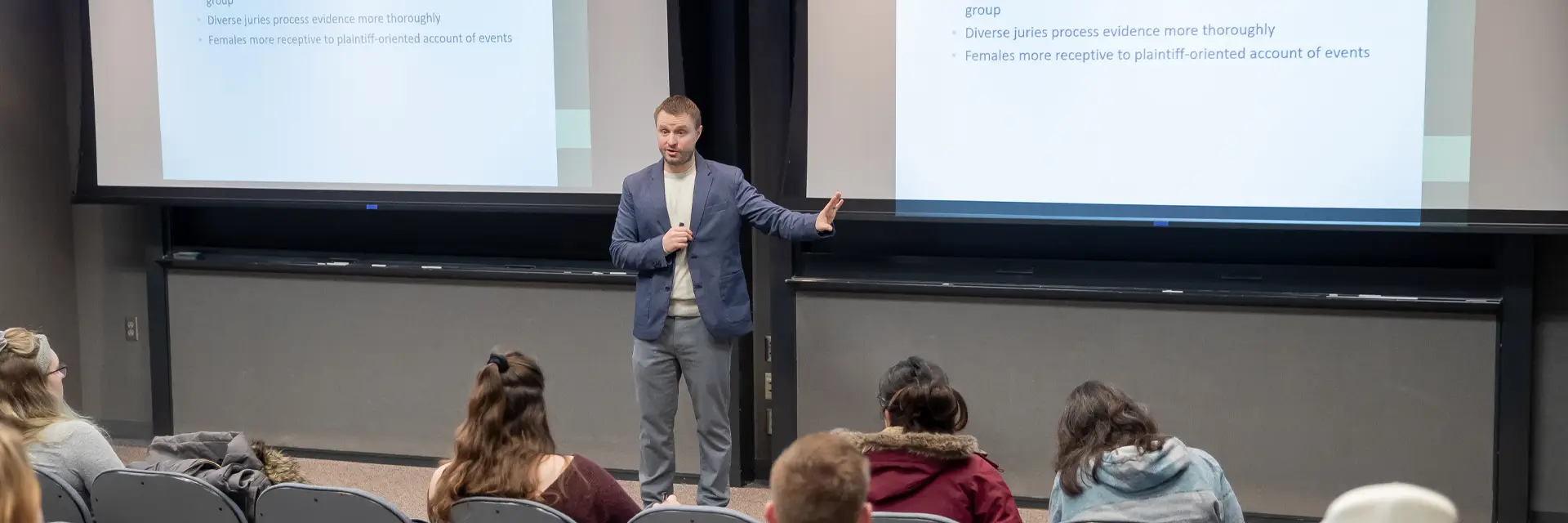Master's in Forensic Psychology
Discover the fascinating connections between psychology and the legal field.
Be in demand. Forensic psychology and criminology are rapidly growing specialty areas of psychology with many opportunities for professional advancement. UND’s top-ranked master’s in Forensic Psychology prepares you for various psychology-related careers.
- Program type:
- Master's Degree
- Format:
- On Campus or Online
- Est. time to complete:
- 2 years
- Credit hours:
- 30
UND’s Forensic Psychology Master’s Programs
On-Campus or Online Master's in Forensic Psychology
-
Earn an affordable, accredited, and highly respected master’s degree. There are no residency requirements or GRE requirement.
-
Enhance your statistical knowledge through relevant course work.
-
Study at a Carnegie R1 Institution ranked #144 by the NSF. In 2025, just 187 American universities held the R1 status.
-
Choose electives where you can focus on a special topic.
-
Participate in faculty-directed research.
-
Enhance your professional skills at 60+ free workshops offered through the UND School of Graduate Studies. Our goal is to provide you with the workforce skills and job search strategies to succeed.
What can you do with a master's in Forensic Psychology?
Master's in Forensic Psychology Courses
Best Online Forensic Psychology Master's Programs
Flexible Online Master's in Forensic Psychology
Accredited Forensic Psychology Graduate Programs
UND's Forensic Psychology master's program is accredited on a national and regional level.
APA Accredited Graduate Program
The American Psychological Association (APA) does not accredit master's or undergraduate level programs in psychology. The APA only accredits doctoral programs. Therefore, the bachelor's degree in Psychology and master's degree in Forensic Psychology cannot be accredited by the APA.
The University of North Dakota's Department of Psychology offers a doctoral program in clinical psychology that is fully accredited by the APA.
Regionally Accredited Forensic Psychology Master's
The University of North Dakota is regionally accredited by the Higher Learning Commission of the North Central Association of Colleges and Schools. UND has been accredited since 1913, when the Association was first organized.
For information on special accreditation's the University has at the college, department or program level, please see UND Accreditation.
Why is an accredited Forensic Psychology master's important?
Accreditation assures the quality of higher education institutions and programs. In the United States, accreditation is a voluntary, non-governmental, peer-review process that determines if established quality standards are being met.
- Accreditation is a major way for students, families, employers, government officials and the media to know an institution or program provides a quality education.
- Accreditation helps students choose quality college programs that qualify for federal financial aid.
- Accreditation enables employers to recruit graduates they know are well-prepared. Many employers will only provide tuition assistance to employees for accredited programs.
- Accreditation is used by registration, licensure and certification boards to screen applicants.
- Accreditation gives colleges and universities a structured mechanism to assess, evaluate and improve the quality of their programs.
FAQs
Yes, the job outlook for psychologists, including forensic psychologists, is projected to grow by 6% from 2022 to 2032, indicating high demand for professionals in this field.
Psychologists, including those with a master's in Forensic Psychology, earn a median annual wage of $85,330. However, the salary can vary significantly based on location, employer and the specific role.
Typically, it takes around two years to complete a master's in Forensic Psychology. The program consists of 30 credits (or 10 courses). As such, a student would have to take 2 courses per semester, including summer, to graduate in 2 years.
The fastest-growing branch of forensic psychology is considered correctional psychology, which involves working with individuals within the criminal justice system, including prisons and rehabilitation programs.
Leaders in Forensic Psychology
Uncover what sets UND apart as trailblazers in the field of Forensic Psychology.
